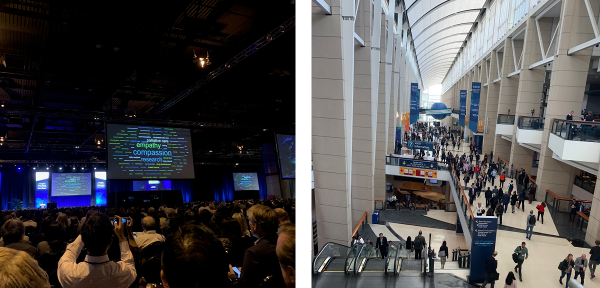By Hisanaga Nomura, National Cancer Center Hospital East and Yoshikazu Tazaki, Asahikawa Medical University
Everyone knows this meeting is the largest oncology meeting in the world. A lot of investigators and clinicians participated and discussed the latest findings in cancer research. This report summarizes my perspective as a pharmacist who participated in this conference.
 |
| At ASCO Annual Meeting |
In the presentations this year, the topics of genome-related study, the development of molecular targeted therapies, and gene therapy such as CAR-T therapy was attracting much attention. I would like to focus on two studies of interest to Oncology Pharmacists.
The first study to be covered is a nausea and vomiting study. Current evidence supports a four-drug combined therapy for High emetic risk regimens. Navari RM et al. suggested an olanzapine (OLZ) dose of 10mg in a phase III study1. However, in clinical practice, patients sometimes become drowsy due to taking the olanzapine 10mg. This study is the first study comparing 5mg or placebo.
Title: A randomized, double-blind, placebo-controlled phase III trial evaluating olanzapine 5mg combined with standard antiemetic therapy for the prevention of chemotherapy-induced nausea and vomiting in patients receiving cisplatin-based chemotherapy: J-FORCE Study. Abstract#11503
Patients receiving cisplatin (>50mg/m2) were randomly assigned to either OLZ 5mg or placebo on day 1-4, combined with APR, PALO and DEX. The primary endpoint was complete response (CR) defined as no vomiting and no rescue medications in the delayed phase (24-120 h). Result, a total of 710 patients were enrolled. CR in the delayed phase was 79.1% (95% CI: 74.9-83.3) in the OLZ 5mg arm and 65.8% (95% CI: 60.9-70.8) in the placebo arm (p< 0.001). The most common treatment-related adverse event was somnolence (43.1% for OLZ vs. 33.0% for placebo). OLZ 5mg combined with APR, PALO and DEX can be considered a new standard antiemetic therapy in patients receiving cisplatin-based chemotherapy. However, patients of this study were only Japanese. So it is required to complete an international study to determine the appropriate dose of OLZ.
The other study is a phase III study in esophageal cancer. In the past 20 years, a lot of new drugs have become available for colorectal and gastric cancer. For esophageal cancer, especially squamous cell carcinoma, there are still few drugs available. In the study of esophageal cancer, there were a few clinical trials of administrating molecular targeted drugs2,3 although all were negative studies. This study compared pembrolizumab vs chemotherapy as second-line therapy for patients with advanced/metastatic squamous cell carcinoma (SCC) and adenocarcinoma (ACC) of the esophagus.
Title: Pembrolizumab vs. chemotherapy as second-line therapy for advanced esophageal cancer: Phase III KEYNOTE-181 study. Abstract #4010
Eligible patients were randomized 1:1 to pembrolizumab 200 mg Q3W for up to 2 years or choice of paclitaxel 80-100mg/m2 on days 1, 8, 15 q4 weeks; docetaxel 75 mg/m2 q3weeks, or irinotecan 180mg/m2 q2 weeks). There were three primary end points. The first one was OS in the SCC (α=0.8 P< 0.0085). The second one was PD-L1 combined positive score CPS ≥10 (α=0.8 P< 0.0077). The last one was ITT (α=0.8 P< 0.0077). Results: 628 patients were randomized including 401 with SCC, and 222 with CPS> 10 in this study. In the first endpoint (CPS> 10), pembrolizumab was superior to chemotherapy for OS (median 9.3 vs 6.7 months; HR 0.69; 95% CI 0.52-0.93; P=0.0074). In the second endpoint (SCC), the 12 month OS rate in patients with SCC was 39% vs 25%. Pembrolizumab was superior to chemotherapy for OS (HR 0.75; 95% CI 0.61-0.939; P=0.0035). In the last primary endpoint (ITT), Pembrolizumab was not superior to chemotherapy for OS (median 7.1 vs. 7.1 months; HR 0.85; 95% CI 0.72-1.01; P=0.031). Conclusion: Pembrolizumab significantly improved OS vs chemo as second-line therapy for advanced esophageal cancer with PD-L1 CPS ≥10 and SCC.
I’m looking forward to the next study (the phase 3 KEYNOTE-590 study of pembrolizumab plus chemotherapy as first-line therapy for advanced esophageal cancer).
In the near future, I hope I will participate in ASCO for presenting my research.
- Navari RM, Gray SE, Kerr AC: Olanzapine versus aprepitant for the prevention of chemotherapy-induced nausea and vomiting: a randomized phase III trial. J Support Oncol 9:188-95, 2011
- Dutton SJ, Ferry DR, Blazeby JM, et al: Gefitinib for oesophageal cancer progressing after chemotherapy (COG): a phase 3, multicentre, double-blind, placebo-controlled randomised trial. Lancet Oncol 15:894-904, 2014
- Lorenzen S, Schuster T, Porschen R, et al: Cetuximab plus cisplatin-5-fluorouracil versus cisplatin-5-fluorouracil alone in first-line metastatic squamous cell carcinoma of the esophagus: a randomized phase II study of the Arbeitsgemeinschaft Internistische Onkologie. Ann Oncol 20:1667-73, 2009
